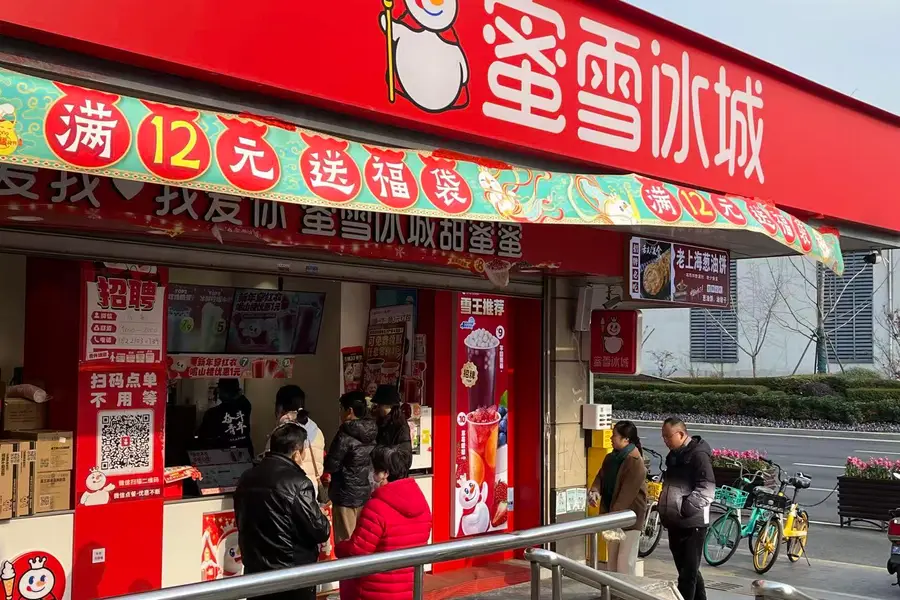Analysts are calling the leading bubble tea chain’s revenue and profit gains unsustainable as its takeout delivery partners pledge to cut back on discounts and vouchers
Key Takeaways:
- Mixue’s shares slid by 15% in the week after the leading ice cream, fruit and tea drinks chain reported strong revenue and profit growth in the first half of 2025
- A price war among China’s takeout delivery companies that helped to fuel the growth of Mixue and its rivals is coming to an end, signaling slower gains ahead
By Edith Terry
“Involution” has become the buzzword of the moment in China, as the term for price wars characterized by cutthroat and irrational competition hits one sector after another. The latest case of the phenomenon, also often called a “race to the bottom,” began in February when internet giant JD.com announced it would enter the food delivery market, immediately threatening the duopoly of Meituan and Ele.me.
Mixue Group (2097.HK) has been among the winners in the resulting food delivery price war, with its low-cost, high transaction volume ice cream, bubble tea and coffee products flying out of stores and into consumers hands via takeout dining couriers. That boost shows up in Mixue’s midyear financial report, released last week, showing its revenue rose 39.3% year-over-year to 14.9 billion yuan ($2.1 billion) in the first half of 2025, while its profit jumped by 44.1% to 2.72 billion yuan.
But its shares have fallen by more than 15% in the week since the announcement and seem set to languish further on concerns about the sustainability of the company’s banner first-half.
Goldman Sachs set the tone for those worries, saying high subsidy levels from the takeout delivery platforms were coming to an end, signaling Mixue’s growth would return to more normal levels. According to Goldman, which maintained its “buy” rating on the stock, a slowdown in growth for takeout sales across China in July compared with June was a “clear signal” that the recent delivery wars were winding down.
Goldman also slashed its target price for Mixue from HK$599 to HK$570 based on an expected price-to-earnings (P/E) ratio of 30 times for 2026. Daiwa Research cut its price target even more to HK$535 from HK$608, but continued to rate Mixue as an “outperform.” Daiwa argued that Mixue was less dependent on delivery company subsidies than peers with higher price points, and that its ability to continue to attract franchisees was a sign of its health.
Mixue’s signature tea drinks are among the cheapest in its peer group, typically priced between 8 yuan and 20 yuan, or around $1 to $3. That’s helped it attract a huge customer base across China, where it’s known for its snowman mascot, soft-serve ice cream and bubble tea, or boba. The delivery wars, with their takeout vouchers and other delivery discounts, could bring the price of a 6 yuan ice cream cone delivered straight to a customer’s door to zero, without any actual cost to Mixue.
After food deliveries soared in May at the height of the price war, China’s top market watchdog, the State Administration for Market Regulation, called the three big tech delivery companies in for a lecture on “rational” competition. By August the three had agreed to mend their ways, raising concerns not only about future takeout sales for Mixue, but also peers like Chabaidao (2555.HK), Guming (1364.HK), and Auntea Jenny (2589.HK).
The timing of the development was bad for all four chains, coming as they released their midyear reports last week. But as the industry leader and arguably the biggest beneficiary of the price wars due to its low prices, Mixue’s shares seemed to suffer the most.
Post-IPO superstar
Mixue has been a superstar since its Hong Kong IPO in March, when it raised $444 million. Its network of mostly franchised stores in smaller Chinese cities grew by more than 20% year-on-year to more than 53,000 outlets by the end of June. Mixue’s main revenue source comes from the sale of goods and equipment to its franchisees, which increased by 39.6% year-on-year to 14.5 billion yuan in the first half of this year.
Mixue and its peers have also been looking overseas for growth outside their overheated home market. But its international expansion has been more restrained. Its 4,733 stores in 11 countries at the end of June was down from 4,895 stores at the end of last year, as it closed underperforming outlets in Indonesia and Vietnam and grappled with local supply chain issues in some of its overseas markets.
Even after the post-report selloff, Mixue shares are still roughly double the price of their IPO in March, when they jumped 43% on their first trading day. The story is much the same for Chabaidao, Guming and Auntea Jenny, whose shares did well when the delivery price war was at its height, but have slumped since then despite decent results for the first half of the year.
Chabaidao, with its ChaPanda store network, reported last week that its revenue rose 4.3% year-on-year to 2.5 billion yuan in the first half of 2025, while its profit rose 38% to 326 million yuan. Nonetheless, its shares fell 4% the next trading day. Like Mixue, analysts still remain relatively positive on the company, with all three polled by Yahoo Finance rating the company a “buy.”
Guming’s revenue rose 41.2% in the first half of the year to 5.7 billion yuan, while its profit more than doubled to 1.6 billion yuan. But like the others, Guming’s shares also fell in the days after the release of its report, even as all 12 analysts on Yahoo Finance rated the company a “buy.” Like Mixue, Guming’s shares have still more than doubled since it raised $232 million in its Hong Kong IPO in February.
Auntea Jenny also reported a 9.7% increase in its revenue for the first half of the year to 1.8 billion yuan, as its profit grew 20.9% to 203 million yuan. And like the others, its shares fell about 6% in the days after the report came out, though they still trade about 20% above the offering price from their May IPO, when the company raised HK$273 million.
The conclusion should be obvious – all four tea chains could be undervalued following the recent selloff with the end of the delivery price war, and could be decent bets in China’s current consumption environment where people favor cheap eats. They may not be globally recognized brand names just yet, but certainly seem to have such potential. Even at relatively high P/E ratios of 32 for Mixue, 21 for Chabaidao, 30 for Guming and 39 for Auntea Jenny, the stocks could still be worth a closer look after the recent selloff.
To subscribe to Bamboo Works weekly free newsletter, click here







